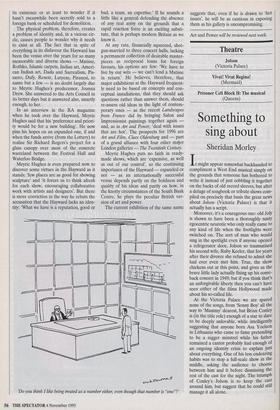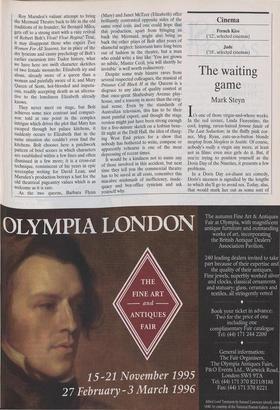Theatre
Jolson (Victoria Palace) Vivat! Vivat Regina! (Mermaid) Prisoner Cell Block H: The musical (Queens)
Something to sing about
Sheridan Morley
It might appear somewhat backhanded to compliment a West End musical simply on the grounds that someone has bothered to write it instead of just cobbling it together on the backs of old record sleeves, but after a deluge of songbook or tribute shows com- piled on precisely that basis the great news about Jolson (Victoria Palace) is that it actually has a script.
Moreover, it's a courageous one: old Joly is shown to have been a thoroughly nasty egocentric neurotic who only really came to any kind of life when the footlights were switched on. The sort of man who would sing in the spotlight even if anyone opened a refrigerator door, Jolson so traumatised his second wife, Ruby Keeler, that for years after their divorce she refused to admit she had ever even met him. True, the show chickens out at this point, and gives us the brave little lady actually fixing up his come- back concert in 1949; but if you think that's an unforgivable liberty then you can't have seen either of the films Hollywood made about his so-called life.
At the Victoria Palace we are spared none of the songs, from 'Sonny Boy' all the way to 'Mammy' dearest, but Brian Conley is (in the title role) enough of a star to dare to be deeply unlovable, while intelligently suggesting that anyone born Asa Yoe'son in Lithuania who came to fame pretending to be a nigger minstrel while his father remained a cantor probably had enough of an ongoing identity crisis to explain just about everything. One of his less endearing habits was to stop a full-scale show in the middle, asking the audience to choose between him and it before dismissing the rest of the cast for the night. The triumph of Conley's Jolson is to keep the cast around him, but suggest that he could still manage it all alone. Roy Marsden's valiant attempt to bring the Mermaid Theatre back to life in the old traditions of its founder, Sir Bernard Miles, gets off to a strong start with a rare revival of Robert Bolt's Vivat! Vivat Regina! True, it may disappoint those who expect Two Women For All Seasons, for in place of the dry lyricism and canny psychology of Bolt's earlier excursion into Tudor history, what we have here are swift character sketches of two female monarchs: Elizabeth icy and alone, already more of a queen than a woman and painfully aware of it, and Mary Queen of Scots, hot-blooded and impetu- ous, readily accepting death as an alterna- tive to the loneliness Elizabeth already knows.
They never meet on stage, but Bolt achieves some nice contrast and compari- son: told at one point in the complex intrigue which drives the plot that Mary has escaped through her palace kitchens, it suddenly occurs to Elizabeth that in the same situation she couldn't even find the kitchens. Bolt chooses here a patchwork pattern of brief scenes in which characters are established within a few lines and often dismissed in a few more; it is a cross-cut technique, reminiscent of his years in epic screenplay writing for David Lean, and Marsden's production betrays a lust for the old theatrical pageantry values which is as welcome as it is rare.
As the two queens, Barbara Flynn (Mary) and Janet McTeer (Elizabeth) offer brilliantly contrasted opposite sides of the same royal coin, and one could hope that this production, apart from bringing us back the Mermaid, might also bring us back the other plays of Bolt after years of shameful neglect: historians have long been out of fashion in the theatre, but a man who could write a line like 'You are grown so subtle, Master Cecil, you will shortly be invisible' is well worth rediscovery.
Despite some truly bizarre raves from several respected colleagues, the musical of Prisoner Cell Block H at the Queens is a disgrace to any idea of quality control at that once-great Shaftesbury Avenue play- house, and a travesty in more than the orig- inal sense. Even by the standards of Australian television, this has to be their most painful export, and though the stage version might just have been strong enough for a five-minute sketch on a lesbian bene- fit night at the Drill Hall, the idea of charg- ing West End prices for a show that nobody has bothered to write, compose or apparently rehearse is one of the most depressing of recent times. It would be a kindness not to name any of those involved in this accident, but next time they tell you the commercial theatre has to be saved at all costs, remember this macabre mishmash of inefficiency, inade- quacy and box-office cynicism and ask yourself why.











































































 Previous page
Previous page